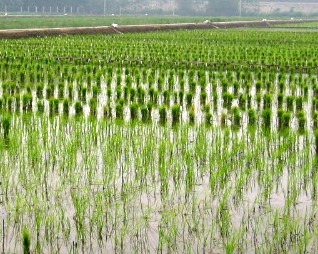Strengthening the foundations of a nascent network: GCP collaborators gather for a workshop on products management and delivery in GCP rice research in Asia (Bangkok, Thailand, 6 and 8 November 2007)
- Friday, 09 November 2007 20:38
For two days in November 2007 selected collaborators of GCP projects on rice in Asia came together for a Subprogramme 3—Subprogramme 5-organised workshop on Products management and delivery in GCP rice research in Asia. The workshop was held on 6th and 8th November in the frame of the 6th Asian Crop Science Association Conference and the 2nd International Conference on Rice for the Future, organised by BioAsia in Bangkok, Thailand.
Taking advantage of the location and high presence of GCP partners due to attend the 2007 ‘BioAsia’ event, the opportunity to gather key National Research Systems and Principal Investigators working on GCP rice projects in Asia was too great to miss. The workshop, coordinated by GCP SP5 Leader Carmen de Vicente and SP3 Leader Philippe de Monneveux, and attended by 24 participants hailing from nine countries in Asia, opened with an introduction to the concept of Product Management and Delivery in GCP, followed by an open discussion. Teams presented ongoing activities of their GCP rice projects in Asia, laying particular emphasis on already available or soon-to-be available products, product validation plans and product transfer proposals. Products listed were numerous and varied, including, among others, populations, germplasm, molecular markers and protocols and methods.
Day two of the event saw some lively and animated discussions, focusing mainly on the analysis of user interests, needs and constraints. User demands revealed a wide array of interests. The Subprogramme 2-funded Competitive project G3005.02: Revitalising marginal lands: Discovery of genes for tolerance of saline and phosphorus deficient soils to enhance and sustain productivity, led by IRRI’s Ismail Abdelbagi, induced various requests from GCP partners, including, among others, a need for salinity-tolerant germplasm and access to phenotyping facilities from Myanmar, P-deficiency tolerant germplasm from Thailand and Bangalore, India, and P-deficiency tolerant markers from Indonesia. Similarly, the SP3-supported Commissioned project G4005.18: Development of low-cost gene-based trait assay technologies in cereals, also led by IRRI, generated demands from Laos and Myanmar for MAS training and resistant germplasm, as well as for blast markers from Bangladesh and Thailand, SNPs and RILs from Bangalore, India, and MAS technologies from Tamil Nadu, India. All Mekong countries expressed a strong desire for cooking quality (glutinous) and for submergence tolerance and blast.
One key result of the debates was the identification of common constraints between projects, as well as common activities that might serve to complement other teams’ projects. Consequently, synergies within the GCP rice Asian community were identified, and informal links between projects created. For SP5 Leader Carmen de Vicente, the most rewarding element of the event was evident: “The chance for so many developing country partners to come together and exchange ideas is rare”, she explains. “In providing such an array of partners with a forum to share experiences and information, we witnessed a real consolidation of a network. Participants present were clearly open to change and recognised that what’s useful for one group can also be helpful to another. Our community of users is expanding, and with it, so will the use of our products and resources”.
Reflecting on the successful outcomes and potential future impact of the meeting, and recognising the need to help fasten the ties amongst this nascent Asian network, GCP is now considering the possibility of introducing a coordinator figure to the enthusiastic team. Through regular interaction with the various players, the assigned coordinator would play a central role in identifying the product developments and user needs of the GCP rice community in Asia, ensuring that voices are heard and that the necessary support is delivered effectively and efficiently.
Whilst GCP will monitor the progress of the community and will remain actively involved in supporting and encouraging the ongoing activities, the idea, as highlighted by de Vicente, is that the network will eventually become strong enough to go it alone: “Right now”, she explains, “our role is to support, animate and activate the network. As time goes on though, our expectation is that the foundation will become solid enough to continue without our support, acting, instead, as an all-essential avenue for sustaining GCP research, even after the day when GCP, as a time-bound, 10 year-long programme, ceases to exist”.
The Rice in Asia network can be considered as the first in a series of GCP Crop and Regional Platforms which are set to develop over the coming months. More information on these platforms will be made available in due course.
Presentations and other supporting documents from the workshop are available on Slideshare.



